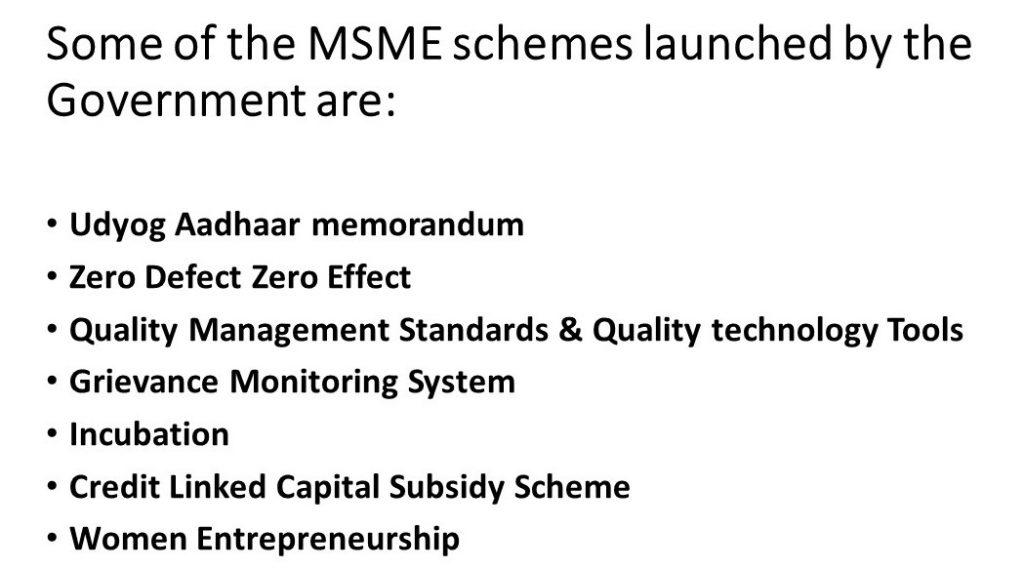MSME stands for Micro, Small and Medium Enterprises. In a developing country like India, MSME industries are the backbone of the economy.
The MSME sector contributes to 45% of India’s Total Industrial Employment, 50% of India’s Total Exports and 95% of all industrial units of the country and more than 6000 types of products are manufactured in these industries (As per msme.gov.in). When these industries grow, the economy of the country grows as a whole and flourishes. These industries are also known as small-scale industries or SSI’s.
What are Micro, Small and Medium Enterprise?
MSME are classified into two categories:
i. Manufacturing enterprise; and
ii. Service enterprise.
They are defined in term of investment in Plant and Machinery/ Equipment as below :

Benefits of MSME Registration
- Due to the MSME registration, the bank loans become cheaper as the interest rate is very low around ~ 1 to 1.5%. Much lower than interest on regular loans.
- There are various tax rebates offered to MSME.
- It also allowed credit for minimum alternate tax (MAT) to be carried forward for up to 15 years instead of 10 years
- There are many government tenders which are only open to the MSME Industries.
- They get easy access to credit.
- Once registered the cost getting a patent done, or the cost of setting up the industry reduces as many rebates and concessions are available.
- Business registered under MSME are given higher preference for government license and certification.
- There is a One Time Settlement Fee for non-paid amounts of MSME.
Documents Required for MSME Registration
The entity has to submit documents like business address proof, copies of purchase and sale bill, and licenses from regulatory bodies.
- Business Address Proof
- Copies of Sale Bill and Purchase Bill
- Partnership Deed/ MoA and AoA
- Copy of Licenses and Bills of Machinery Purchased
Business Address Proof:
If the premise is self-owned– Allotment letter, possession letter, lease deed or property tax receipt. If there is a municipal license in the business name or in the name of the proprietor, partner or director of the business, no other possession document is required to be submitted.
If the premise is rented– Rent receipt and a no objection certificate from the landlord is required. Also, any utility bill or document evidencing the landlord’s ownership is to be submitted.
Copies of Sale Bill and Purchase Bill:
Business is required to submit a copy of sale bill related to each end product that it will supply. Also, for each raw material that it will purchase, a purchase bill has to be submitted.
Partnership Deed/ MoA and AoA
If the business is a partnership firm, it has to submit its partnership deed. If the partnership firm is registered, it has to submit registration certificate also.
In case of a company, a copy of Memorandum of Association and Articles of Association, and certificate of incorporation has to be submitted. With it, a copy of the resolution passed in general meeting, and the copy of board resolution authorizing a director to sign the MSME application is also to be submitted.
Copy of Licenses and Bills of Machinery Purchased
In few cases, the applicant has to submit a copy of industrial license which is to be obtained by giving an application to Govt. of India. Further, all bills and receipts related to purchase and installation of plant and machinery have to be kept safe and required to be submitted on demand.
MSME schemes launched by the Government are:

Udyog Aadhaar memorandum:
Aadhaar card is a 12 digit number given to all individuals by the government. In this, the Aadhaar card is a mandatory requirement. The benefit of registering in this scheme is ease in availing credit, loans, and subsidies from the government. Registration can be done both ways in the online mode or the offline mode.
Zero Defect Zero Effect:
In this model, goods that are manufactured for export have to adhere to a certain standard so that they are not rejected or sent back to India. To achieve this the government has launched this scheme. In this, if the goods are exported these are eligible for some rebates and concessions.
Quality Management Standards & Quality technology Tools:
Registering in this scheme will help the micro, small and medium enterprises to understand and implement the quality standards that are required to be maintained along with the new technology. In this scheme, activities are conducted to sensitize the businesses about the new technology available through various seminars, campaigns, activities etc.
Grievance Monitoring System:
Registering under this scheme is beneficial in terms of getting the complaints of the business owners addressed. In this, the business owners can check the status of their complaints, open them if they are not satisfied with the outcome.
Incubation:
This scheme helps innovators with the implementation of their new design, ideas or products. Under this from 75% to 80% of the project cost can be financed by the government. This scheme promotes new ideas, designs, products etc.
Credit Linked Capital Subsidy Scheme:
Under this scheme, new technology is provided to the business owners to replace their old and obsolete technology. A capital subsidy is given to the business to upgrade and have better means to do their business. These small, micro and medium enterprises can directly approach the banks for these subsidies.